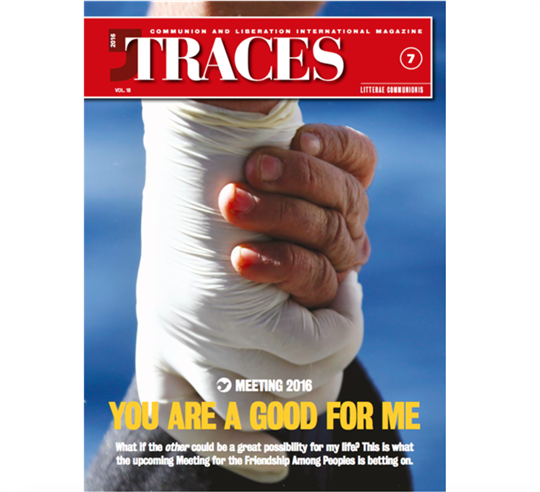
Traces N.7, July/August 2016
Here, Where We AreHow do we experience mercy? Above all, “when have we discovered we need mercy to live?” This question is the theme of the summer vacation for CL communities. It is a pressing question, at the end of such an intense year, marked by terrible events and high tension (the terrorist attacks in Paris, Brussels, and now Istanbul, the onslaught of refugees, the many fraught electoral battles, the worsening economic and political crisis after the Brexit referendum...), but at the same time an extraordinary year because the Pope has proposed imprinting it with the seal of the one fact that can embrace all this anguish: mercy. A fact capable of judging everything, filling every circumstance, begging for our wounded humanity, giving it “a heart that... is not old and patched, but new and re-created,” as the Pope said during his June 2nd meditation at his retreat for priests, a heart regenerated by a “second creation [...] even more wondrous than the first.” Francis reminds us of this continually in a thousand ways: mercy creates anew, that is, it causes something new to be born. It changes us. But how and when?
Answering this question is crucial. Or better, becoming aware of it is crucial, because there is only one road for answering a question like this without getting lost in generic, abstract discourse: experience. This experience is becoming aware, discovering the moments in which we realize we need mercy to live, and not only in extraordinary circumstances, but in normal, daily life, at home, at work, in our studies, in our relationships. Here, in daily life, is where we are, not elsewhere. We need help here, in daily life. Either the newness emerges in our daily life, or it simply does not exist.
At one of these vacations, having listened to a series of testimonies about very “daily” happenings (getting angry at a friend, but finding it is “an opportunity for understanding myself better”; a marriage in crisis, which however provides a glimpse of “the possibility that God is asking me for everything”; a difficulty at work that changes the person’s outlook, so that “maybe I won’t leave my daughters any money, but I will leave them what counts most in life”; and similar things), Fr. Julián Carrón, the leader of CL, observed, “The difference that an Other introduces as a help is to look at reality in a true way, deep down. It is not that I look at it the way I want, and then someone just shows me mercy in helping me live it. Christianity introduces a new gaze.” Again, “It is not a matter of continuing to see reality like everyone else and then enduring it, but of a change of judgment: this is what Christ introduced.” This is how mercy acts.
It is the “new heart, created anew” of which the Pope spoke. Not a “supplement of goodness” or a greater capacity to endure: a different gaze, a change of judgment. This different gaze is what enables us to glimpse in our relationship with others (anyone, an immigrant, a colleague, a friend, or a stranger) the aspect of these relationships that is truest and at the same time too often forgotten: relationship serves to help me understand myself, to help me grow in my humanity. “You are a good for me,” is the title of the upcoming Meeting of Rimini. This statement is also seen in the pages of this issue, beginning with those dedicated to Mother Teresa of Calcutta.
We propose the articles here first of all as a help in reflecting on the past year, to discover the traces of this different gaze in us, if and when it happened to us. We also propose these articles as an instrument for the coming weeks, so that the “free time” of summer can be “a beautiful opportunity to discover episodes of this kind,” as Carrón recently wished for us, and “to verify even more whether the method of God truly works,” here where we are, in our daily lives.